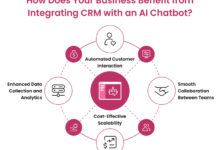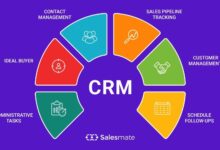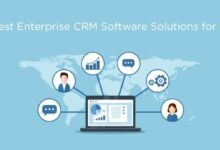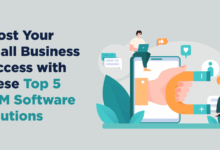Top Cloud-Based CRM Platforms
Top Cloud-Based CRM Platforms are revolutionizing how businesses manage customer relationships. This exploration delves into the leading platforms, their functionalities, and the crucial factors to consider when selecting the ideal solution for your organization’s specific needs. We’ll examine pricing models, integration capabilities, security measures, and future trends shaping this dynamic landscape.
From understanding the advantages of cloud-based systems over on-premise solutions to navigating the complexities of data privacy regulations and AI integration, this comprehensive guide provides a clear path toward optimizing your customer relationship management strategy. We’ll analyze key features, compare leading platforms, and equip you with the knowledge to make an informed decision.
Introduction to Cloud-Based CRM Platforms
Cloud-based CRM platforms represent a significant shift in how businesses manage customer relationships. They offer a flexible and scalable solution for storing, accessing, and analyzing customer data, all while eliminating the need for extensive on-site infrastructure. This approach allows businesses of all sizes to leverage powerful CRM functionalities without the high upfront costs and ongoing maintenance associated with traditional on-premise systems.
Cloud-based CRM systems offer several key advantages over their on-premise counterparts. Primarily, they reduce IT infrastructure costs by eliminating the need for servers, software licenses, and dedicated IT staff for maintenance and updates. The scalability of cloud-based solutions is another significant benefit, allowing businesses to easily adjust their storage and processing capacity as their needs evolve. Furthermore, accessibility is greatly enhanced, enabling authorized personnel to access customer data from anywhere with an internet connection, fostering greater collaboration and responsiveness. Finally, regular automatic updates ensure that the system remains current with the latest security patches and feature enhancements.
Key Features of Cloud-Based CRM Platforms
Top cloud-based CRM platforms typically incorporate a wide array of features designed to streamline customer interaction and improve business processes. These features often include contact management (allowing for centralized storage and organization of customer information), sales force automation (automating tasks such as lead tracking and opportunity management), marketing automation (facilitating targeted marketing campaigns and tracking their effectiveness), customer service support (providing tools for managing customer inquiries and resolving issues), reporting and analytics (offering insights into customer behavior and sales performance), and integration capabilities (allowing seamless connection with other business applications). The specific features offered can vary depending on the platform and chosen pricing tier.
Comparison of CRM Deployment Models
Choosing the right deployment model is crucial for aligning CRM functionality with a business’s specific needs and resources. The following table compares cloud, on-premise, and hybrid deployment models across key criteria:
| Deployment Model | Cost | Scalability | Security |
|---|---|---|---|
| Cloud | Typically lower upfront costs; subscription-based pricing; variable costs depending on usage. | Highly scalable; easily adjust resources based on demand. | Relies on the vendor’s security measures; data is typically encrypted; compliance certifications are important considerations. |
| On-Premise | High upfront investment in hardware, software, and IT infrastructure; ongoing maintenance costs. | Scalability requires significant upfront planning and investment; less flexible than cloud solutions. | Greater control over security; requires dedicated IT staff and robust security protocols. |
| Hybrid | Moderate upfront and ongoing costs; a balance between cloud and on-premise expenses. | Moderate scalability; allows for flexible resource allocation between cloud and on-premise environments. | Combines the security aspects of both models; requires careful planning and management of data across environments. |
Leading Cloud-Based CRM Platforms
Choosing the right cloud-based CRM platform is crucial for business success. The market offers a wide variety of options, each with its strengths and weaknesses. Understanding the core functionalities, pricing models, and user experiences of leading platforms is essential for making an informed decision.
Leading Cloud-Based CRM Platforms: Core Functionalities
Five leading cloud-based CRM platforms are Salesforce Sales Cloud, Microsoft Dynamics 365, HubSpot CRM, Zoho CRM, and SAP CRM. Each platform offers a comprehensive suite of tools, but their core functionalities vary slightly. Salesforce Sales Cloud excels in sales force automation, providing robust tools for lead management, opportunity tracking, and sales forecasting. Microsoft Dynamics 365 offers a more integrated approach, connecting CRM with other Microsoft business applications like ERP. HubSpot CRM emphasizes inbound marketing and sales, with strong features for content management and lead nurturing. Zoho CRM provides a cost-effective solution with a wide range of features suitable for small to medium-sized businesses. SAP CRM caters to large enterprises, offering extensive customization options and integration capabilities with other SAP applications.
Pricing Models of Leading Cloud-Based CRM Platforms
The pricing models for these platforms vary significantly. Salesforce Sales Cloud uses a tiered subscription model, with pricing based on the number of users and features included. Microsoft Dynamics 365 also employs a tiered subscription model, offering different plans with varying levels of functionality. HubSpot CRM offers a freemium model, with a free plan for basic features and paid plans for advanced functionality. Zoho CRM provides a similar freemium model, with a competitive pricing structure for paid plans. SAP CRM’s pricing is typically customized based on the specific needs and size of the enterprise. It’s important to note that these prices can change and should be verified directly with the providers.
User Interface and User Experience of Leading Cloud-Based CRM Platforms
Each platform boasts a distinct user interface and user experience. Salesforce Sales Cloud is known for its powerful but sometimes complex interface, requiring a learning curve for new users. Microsoft Dynamics 365 offers a more intuitive interface, integrating seamlessly with other Microsoft products. HubSpot CRM presents a clean and user-friendly interface, designed to be accessible to users with varying levels of technical expertise. Zoho CRM also offers a relatively straightforward and user-friendly interface. SAP CRM, due to its extensive customization options, can have a more complex interface depending on the specific configuration.
Key Features Comparison of Leading Cloud-Based CRM Platforms
The following table summarizes the key features of each platform across sales, marketing, and customer service:
| Platform Name | Sales Features | Marketing Features | Customer Service Features |
|---|---|---|---|
| Salesforce Sales Cloud | Lead management, opportunity tracking, sales forecasting, sales pipeline management, contact management | Marketing automation, campaign management, lead nurturing, analytics | Case management, knowledge base, service level agreements (SLAs), customer support portals |
| Microsoft Dynamics 365 | Lead management, opportunity management, account management, sales forecasting | Marketing automation, campaign management, lead scoring, social listening | Case management, knowledge base, customer portals, omnichannel support |
| HubSpot CRM | Contact management, deal tracking, sales pipeline management, email integration | Marketing automation, email marketing, social media management, content management | Live chat, ticketing system, email support, reporting & analytics |
| Zoho CRM | Lead management, contact management, deal tracking, sales pipeline management | Email marketing, social media marketing, landing page creation, analytics | Case management, help desk, knowledge base, customer portals |
| SAP CRM | Lead and opportunity management, sales forecasting, territory management, complex sales processes | Marketing campaign management, lead nurturing, analytics, integration with other marketing tools | Case management, service level management, knowledge management, customer interaction centers |
Integration Capabilities
A robust CRM’s value significantly increases when it seamlessly integrates with other business applications. Effective integration streamlines workflows, improves data consistency, and provides a holistic view of customer interactions across various touchpoints. This interconnectedness is crucial for optimizing business processes and maximizing the return on investment in the CRM system itself.
The ability to integrate a CRM with other software is a key factor to consider when selecting a platform. Different CRMs offer varying levels of integration capabilities, ranging from simple pre-built connectors to extensive API access for custom integrations. Understanding these capabilities is essential for choosing a system that aligns with your specific business needs and existing technological infrastructure.
Common Integration Examples
Many common business applications benefit from CRM integration. Email marketing platforms, for instance, allow for targeted campaigns based on CRM data, ensuring messages reach the right audience at the right time. Similarly, e-commerce platforms integrated with a CRM provide a unified view of customer purchasing behavior, enabling personalized recommendations and improved customer service. Other valuable integrations include accounting software for streamlined financial reporting, project management tools for tracking customer-related projects, and social media platforms for monitoring brand mentions and customer interactions.
API Integrations and Data Synchronization
Different CRM platforms employ various methods for handling API integrations and data synchronization. Some offer pre-built connectors for popular applications, simplifying the integration process. Others provide robust APIs allowing for custom integrations with virtually any application. Data synchronization mechanisms vary, with some using real-time synchronization for immediate data updates, while others employ batch processing for periodic updates. The choice between these methods depends on the specific needs of the business and the sensitivity of the data being synchronized. Real-time synchronization offers immediate visibility but might place a greater load on the system, whereas batch processing is less demanding but introduces a delay in data updates.
Popular Integration Partners
The following lists exemplify popular integration partners for five commonly used cloud-based CRM platforms (note that this is not exhaustive and specific offerings change frequently):
- Salesforce: Mailchimp, Shopify, Zendesk, Marketo, Google Workspace, Adobe Sign
- HubSpot: Gmail, Outlook, Shopify, Slack, Zoom, Google Analytics
- Microsoft Dynamics 365: Microsoft Office 365, Power BI, SharePoint, Azure, Adobe Sign
- Zoho CRM: Zoho Mail, Zoho Projects, Zoho Desk, Google Workspace, Shopify
- SAP Customer Experience (C4HANA): SAP SuccessFactors, SAP Ariba, SAP S/4HANA, SAP Marketing Cloud, various other SAP applications
It is crucial to note that the availability and specific features of integrations can change over time. Always consult the vendor’s documentation for the most up-to-date information.
Security and Data Privacy
The security and privacy of customer data are paramount concerns when choosing a cloud-based CRM platform. Top providers invest heavily in robust security measures to protect sensitive information from unauthorized access, breaches, and misuse. Understanding these measures, the impact of data privacy regulations, and the specific security features offered by different platforms is crucial for informed decision-making.
Data privacy regulations like the General Data Protection Regulation (GDPR) in Europe and the California Consumer Privacy Act (CCPA) in the United States significantly impact how CRM systems are implemented and managed. These regulations grant individuals more control over their personal data and impose strict obligations on organizations handling that data, including the need for consent, data minimization, and robust security protocols. Non-compliance can lead to substantial fines and reputational damage.
Security Measures Employed by Top Cloud-Based CRM Providers
Leading cloud-based CRM providers employ a multi-layered approach to security. This typically includes data encryption both in transit and at rest, robust access controls using role-based permissions, regular security audits and penetration testing, and compliance with various industry security standards like ISO 27001 and SOC 2. Many providers also offer features like two-factor authentication (2FA) and single sign-on (SSO) to enhance user authentication and access management. Furthermore, advanced threat detection and prevention systems are in place to monitor for and respond to potential security incidents.
Impact of Data Privacy Regulations on CRM Usage
GDPR and CCPA necessitate significant changes in how organizations handle customer data within their CRM systems. This includes obtaining explicit consent for data processing, providing individuals with easy access to their data and the ability to request its deletion or correction, and implementing mechanisms to ensure data security and prevent unauthorized data transfers. Compliance requires a proactive approach, involving careful data mapping, policy updates, and employee training. Failure to comply can result in hefty fines and damage to an organization’s reputation. For example, a company failing to meet GDPR requirements could face fines up to €20 million or 4% of annual global turnover, whichever is higher.
Comparison of Data Security Features Across Five Leading Platforms
A detailed comparison requires specifying the five platforms. However, a general comparison can highlight common features and potential differences. For instance, platform A might offer stronger encryption algorithms than platform B, while platform C might have more sophisticated intrusion detection systems. Features like data masking and anonymization, which are vital for data privacy compliance, may vary in their implementation and capabilities across different providers. A thorough evaluation necessitates a detailed review of each platform’s security documentation and potentially, independent security assessments.
Best Practices for Securing Data within a Cloud-Based CRM
Implementing robust security measures requires a multifaceted approach.
- Regular Security Audits and Penetration Testing: Conduct regular security assessments to identify vulnerabilities and ensure the effectiveness of existing security controls.
- Strong Access Controls: Implement role-based access control (RBAC) to restrict access to sensitive data based on user roles and responsibilities.
- Data Encryption: Encrypt data both in transit (using HTTPS) and at rest to protect it from unauthorized access even if a breach occurs.
- Two-Factor Authentication (2FA): Enable 2FA for all user accounts to add an extra layer of security and prevent unauthorized logins.
- Regular Software Updates: Keep the CRM software and all related applications updated with the latest security patches to address known vulnerabilities.
- Employee Training: Educate employees about security best practices, including phishing awareness and password management.
- Data Loss Prevention (DLP) Measures: Implement DLP tools to monitor and prevent sensitive data from leaving the organization’s control.
- Incident Response Plan: Develop and regularly test an incident response plan to effectively handle security breaches and minimize their impact.
Choosing the Right Platform
Selecting the ideal cloud-based CRM platform requires careful consideration of several key factors. The right platform will significantly impact operational efficiency, sales performance, and overall business growth. A mismatched platform can lead to wasted resources and frustrated employees. Therefore, a systematic approach to evaluation is crucial.
Key Factors in Platform Selection
The selection process should prioritize factors directly relevant to the business’s specific needs and goals. These include budget constraints, the size and structure of the sales team, existing IT infrastructure, desired functionalities, and the level of integration required with other systems. Ignoring any of these aspects can result in an unsuitable platform.
- Budget: Cloud-based CRM platforms offer various pricing models, from subscription-based plans to tiered options. Careful consideration of the budget is essential to avoid overspending or selecting a platform with insufficient features.
- Scalability: The platform should be able to accommodate the business’s growth. This includes handling increasing data volumes, expanding user accounts, and integrating new functionalities as needed.
- Integration Capabilities: Seamless integration with existing systems (e.g., email marketing platforms, accounting software) is critical for streamlined workflows and data consistency. Compatibility with essential tools should be a priority.
- User-Friendliness: The platform’s interface should be intuitive and easy to navigate for all users, regardless of their technical expertise. A complex interface can lead to low adoption rates and reduced effectiveness.
- Customer Support: Reliable and responsive customer support is crucial for addressing technical issues and resolving user queries promptly. The availability of various support channels (e.g., phone, email, online chat) should be considered.
Assessing Business Needs
Understanding the business’s specific requirements is paramount. This involves identifying key performance indicators (KPIs), analyzing current processes, and defining the desired outcomes from implementing a CRM. For example, a business focused on lead generation will prioritize features like lead scoring and campaign management, while a business focused on customer service will emphasize features like ticketing and case management.
Examples of Business Size and Platform Choice
A small startup might opt for a simple, affordable CRM like HubSpot CRM (free plan available) or Zoho CRM (affordable entry-level plans), focusing on basic contact management and sales pipeline tracking. Mid-sized businesses might choose Salesforce Sales Cloud or Microsoft Dynamics 365, offering more advanced features and scalability. Large enterprises might opt for highly customizable and integrated solutions like SAP CRM or Oracle Siebel, capable of handling vast amounts of data and complex workflows. The choice depends on the scale of operations and the complexity of the business processes.
Decision-Making Flowchart
The following flowchart outlines a structured approach to selecting a CRM platform:
(Note: The above is a placeholder for a visual flowchart. A real flowchart would show a visual representation of the decision-making process with boxes and arrows.)
Future Trends in Cloud-Based CRM
The cloud-based CRM landscape is in constant evolution, driven by advancements in technology and shifting business needs. Emerging trends are rapidly reshaping how businesses interact with their customers, promising greater efficiency, personalization, and profitability. The integration of artificial intelligence (AI) and machine learning (ML) is particularly transformative, leading to more intelligent and automated CRM systems.
AI and machine learning are revolutionizing various aspects of CRM functionality, impacting everything from lead scoring and sales forecasting to customer service and marketing automation. This increased intelligence translates to significant improvements in business operations, enabling more data-driven decision-making and enhanced customer experiences.
AI-Powered Predictive Analytics
AI algorithms analyze vast amounts of customer data to predict future behavior, such as churn risk or purchase likelihood. This allows businesses to proactively address potential issues and personalize their interactions for improved customer retention and increased sales. For example, a telecommunications company might use AI to identify customers at high risk of churning based on usage patterns and customer service interactions. The system can then trigger automated interventions, such as targeted offers or proactive customer support, to retain these customers.
Enhanced Customer Service Through Chatbots and Virtual Assistants
AI-powered chatbots and virtual assistants are becoming increasingly sophisticated, capable of handling a wider range of customer inquiries with greater accuracy and efficiency. This reduces the burden on human agents, allowing them to focus on more complex issues and improve overall customer satisfaction. Imagine a retail company implementing an AI-powered chatbot on its website. This chatbot can instantly answer frequently asked questions about products, shipping, and returns, freeing up human customer service representatives to handle more intricate customer concerns.
Automated Sales and Marketing Processes
AI and ML are automating various sales and marketing tasks, such as lead scoring, campaign optimization, and personalized content creation. This increases efficiency and improves the effectiveness of marketing efforts. A business-to-business (B2B) software company, for example, might utilize AI to score leads based on their engagement with marketing materials and website activity, prioritizing high-potential leads for the sales team. This automated lead scoring ensures that sales representatives focus their efforts on the most promising prospects.
Infographic: The Future of Cloud-Based CRM
Imagine a stylized graphic depicting a rising upward trend line, representing the growth of cloud-based CRM. The line is vibrant and dynamic, showcasing exponential growth. Key features are overlaid on the graph, such as icons for AI, machine learning, predictive analytics, and automation. A small cloud icon is prominently featured at the top, symbolizing the cloud-based nature of the CRM. The text accompanying the graphic would read: “The Future of Cloud-Based CRM: AI-powered intelligence, predictive analytics, and seamless automation are transforming customer relationship management, driving unprecedented growth and efficiency.” The infographic visually represents the increasing reliance on AI and ML within cloud-based CRM systems, highlighting their role in driving future growth and innovation.
Final Review
Ultimately, the choice of a cloud-based CRM platform hinges on a careful assessment of your business needs, budget, and long-term goals. By understanding the strengths and weaknesses of different platforms, and by prioritizing security and integration capabilities, you can effectively leverage the power of cloud-based CRM to enhance customer relationships, streamline operations, and drive sustainable growth. The future of CRM is undeniably cloud-based, and this guide has equipped you with the insights to navigate this exciting evolution.





